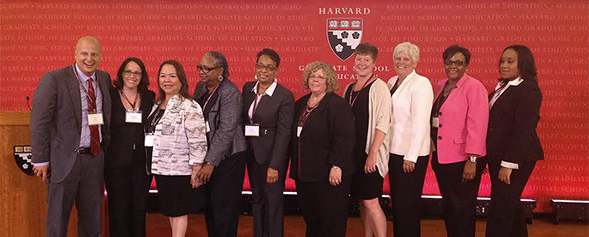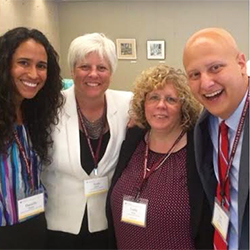Answering the Miracle Question
Professor Trish Hatch worked with the Obama administration to shine a national spotlight on the role school counselors have in student success.

In solution-focused counseling, it’s called the “miracle question.” School counselors ask students to imagine this:
“Suppose you woke up one morning and by some miracle everything you ever wanted, everything good you could ever imagine for yourself, had actually happened — your life had turned out exactly the way you wanted it” (Mason, 2008).
I ask a similar question in the introduction to my new book, “The Use of Data in School Counseling”:
“Suppose you woke up one morning, and by some miracle everything you ever wanted or could ever imagine for the profession of school counseling had actually happened … “
Admittedly, I am a true believer and advocate for the profession of school counseling. A few years ago on a visit to the White House, I had a chance to speak with President Barack Obama. When I thanked him for all he was doing to support school counselors, he responded: "And we will continue to." I held on to that promise.
So in January, when President Obama announced his College Opportunity Agenda, I was glued to the TV waiting for him to mention the vital role school counselors play in improving college opportunities for first generation youth. He talked about college advisors and teaching assistants, but there was no mention of school counselors.
That week I reached out to Greg Darnieder at the U.S. Department of Education about my concern that school counselors had not been publicly positioned within the College Opportunity Agenda. I shared my fears that without legitimizing language specifically addressing the role of school counselors in the College Opportunity Agenda, the profession could be marginalized.
I told Greg that I heard the President’s call for universities to come on board. I promised to make this my priority and do whatever I could to advance the College Opportunity Agenda.

Not long after, the first of several miracles occurred. The First Lady’s Reach Higher Initiative, announced in the spring, includes as one of its four main goals: “supporting high school counselors who can help more kids get into college.”
I was invited to participate in a stakeholder conversation at the White House about the state of school counseling in this country and I nominated another school counselor, who could speak to the challenges of first generation students. Homero Magana, ’06, and I met with senior White House officials in the Eisenhower building to discuss the challenges facing school counselors and how the College Opportunity Agenda and the Reach Higher Initiative could remedy them. White House officials strongly encouraged us to go back to our universities and renew our commitments to increase access to college for underserved students.
Back at SDSU, myself and School Counseling Program Assistant Professors Joey Nuñez Estrada Jr. and Laura Owen, drafted a list of action items, secured approval from the school counseling faculty and College of Education Dean Joseph Johnson Jr., and presented the list to President Elliot Hirshman. The White House response to our suggestions could not have been more positive and enthusiastic!
In June, another miracle – the First Lady showed her support by speaking at the American School Counseling Association (ASCA) national conference. When her speechwriters requested stories of school counselors who had overcame obstacles and/or were making a difference, I submitted a dozen from SDSU. The White House decided to feature our alumni Mikela Jones, ’07, and Rita Guerra, ’05, as examples of exemplary school counselors.
By July 28, six months after the President’s speech, by some miracle, almost everything I ever wanted or could ever imagine for the profession of school counseling had actually happened. The "College Opportunity Agenda: Strengthening School Counseling and College Advising" event, co-sponsored by the Office of the First Lady and held at Harvard University’s Graduate School of Education, attracted an audience of 140 professionals, including Danielle Duarte, ’09, and an online following of more than 500 who participated via live stream to discuss professional development, training, research, programming and tools for school counseling.
Mrs. Michelle Obama said: “School counseling should not be an extra or a luxury just for school systems that can afford it. School counseling is a necessity to ensure that all our young people get the education they need to succeed in today’s economy.”
It was an incredible honor and privilege to serve on the planning team, along with Owen, participate as a breakout session facilitator and take the stage as the featured luncheon speaker, to share the commitments SDSU is making to the Reach Higher Initiatives.
When I was recruited to direct the School Counseling Program at SDSU a decade ago, I was impressed by the deep commitment to social justice within the Department of Counseling and School Psychology and the College of Education. From recruitment practices to grant support, SDSU is committed to equity and access for underrepresented students. Over the past decade, the School Counseling Program and curriculum has been revised to include the new models and professional philosophies. In 2011, The Education Trust’s “Poised to Lead” document listed SDSU school counseling program as one of the best in the country.
At SDSU we are committed to improving our pre-service preparation of school counselors, providing professional development for existing counselors, creating certificate and doctoral programs, and providing research that will likely lead to real increases in college enrollment. We will continue this work because there’s a miracle waiting to happen inside each of the students we serve.
Trish Hatch is director of and an associate professor in the School Counseling Program at San Diego State University.
This story is a part of a series "Aztec Voices" where SDSU faculty, staff and students submit stories about discoveries; travel related to SDSU research or coursework; aha! moments; long-term projects finally coming to fruition; behind-the-scenes stories and transformational experiences. If you would like to submit an "Aztec Voices" story, please contact [email protected].



